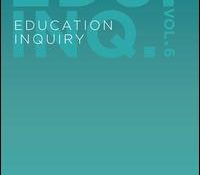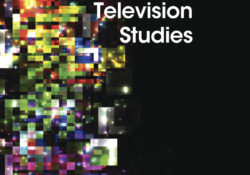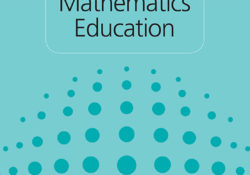tandfonline.com har udgivet en rapport under søgningen „Teacher Education Mathematics‟: ABSTRACT ABSTRACT A conceptual framework is presented to understand and study the role of students’ agency in their school (dis-)engagement from a Funds of Identity (FoI) perspective. The framework includes the notion of agency combined with Funds of Learner Identity (FoLI): learning preferences that can be considered part of people’s Funds of Identity. The framework holds that students manifest agency to negotiate engaging learning experiences when the school’s affordances and constraints are considerably relatable to their FoLI and allow them to define themselves in desired ways. However, adolescents who feel that possibilities to engage their FoLI are rather limited in school are expected to turn to other contexts to learn, such as home, peer groups and workplaces. An exemplary case… Continue Reading →
Like this:
Like Loading...
eric.ed.gov har udgivet: Funded by The Bill & Melinda Gates Foundation, the Literacy Design Collaborative (LDC) and Math Design Collaborative (MDC) offer a set of instructional and formative assessment tools in literacy and math, which were developed to help educators better prepare all students to meet the Common Core State Standards (CCSS) and succeed beyond high school. Following three years of extensive data collection in LDC study sites throughout the country, Research for Action (RFA) has produced three case studies to illustrate how the LDC and MDC tools have been adopted in different settings and contexts, and which approaches and supports have contributed to the successful adoption and use of the tools. The case studies provide a set of „road maps‟ for other sites that will be adopting or scaling… Continue Reading →
Like this:
Like Loading...
tandfonline.com har udgivet en rapport under søgningen „Teacher Education Mathematics‟: ABSTRACT ABSTRACT This article sets out to discuss physical prerequisites for creativity. Creativity has come to be regarded as one of the most valuable attributes a person can have, at least in today’s Western societies. This article builds on and incorporates material from a Swedish project called Entrepreneurship Liminal space, Creativity, and Understanding. The article covers analysis from interviews and video observations from two different milieus especially planned for creativity. Based on observations and interviews, the article’s goal is to emphasize and discuss the importance of understanding the physical aspects of creativity. Theoretically, the paper highlights the theory of affordances through an underlying theoretical intention is the way of regarding children as agents. Most significantly, this study contributes to the… Continue Reading →
Like this:
Like Loading...
tandfonline.com har udgivet en rapport under søgningen „Teacher Education Mathematics‟: ABSTRACT ABSTRACT This study explores academics’ changing agency in curriculum work in higher education. Bourdieu’s concepts of field, habitus and capital, followed by the metaphor of game, are used as tools to analyse stability and change in agency. The interview data collection from 17 academics was implemented twice over 3 years after two different processes of curriculum change at one multidisciplinary research university in Finland. Through narrative analysis, two storylines were identified. The storyline with changes in agency included transformative, sidelined and divided narratives. The storyline with stable agency included development-oriented, autonomous and opposition narratives. The lived experiences create habitus as it is, as internalization of social structures but also as unconscious enterprises to maintain old or develop new forms… Continue Reading →
Like this:
Like Loading...

tandfonline.com har udgivet en rapport under søgningen „Teacher Education Mathematics‟: ABSTRACT ABSTRACT Getting students to understand the particulate nature of matter is a major challenge for chemistry education. In upper secondary school students commonly struggle to distinguish between intra- and intermolecular bonding and analyse chemical bonding in terms of electronegativity. In this study, we explore how creative drama may be used in chemistry education to facilitate students’ explorations of electronegativity and chemical bonding in Swedish upper secondary chemistry education. The study was conducted as a design-based intervention in three cycles in two schools. The interventions (which lasted for 30–60 minutes) were single-lesson-interventions consisting of drama activities and discussions in whole-class and student groups. A qualitative content analysis produced themes that captured the ways in which the students explored electronegativity and… Continue Reading →
Like this:
Like Loading...
tandfonline.com har udgivet en rapport under søgningen „Teacher Education Mathematics‟: ABSTRACT ABSTRACT Drawing on a cross-cultural, qualitative study in Finnish and Korean comprehensive schools, we explore how teacher control and student agency are manifested and exercised in the teaching and learning practices of the “official school” and in the student–teacher interactions of the “informal school”. We also elaborate on how students reflect on control and agency. Bernstein’s concepts of framing and classification are employed as a theoretical lens with which to examine control, agency and hierarchy. Data consists of school observations and interviews with students aged 12 to 14 and their teachers, conducted in six schools. The findings indicate that student agency is intensively constrained in their participation in teaching-learning practices. The analysis also reveals a paradox where students do… Continue Reading →
Like this:
Like Loading...

tandfonline.com har udgivet en rapport under søgningen „Teacher Education Mathematics‟: ABSTRACT ABSTRACT Universities are criticised for overemphasising instrumental values. Instrumental values are important but universities risks undermining cultivation of humanity, critical consciousness and civic agency. Service-learning (SL) is practice that moves teaching and learning beyond the focus on technical skills and instrumental outcomes. Nonetheless, little is known about this role of SL in African and particularly South Africa context. Using a capability approach (CA) as developed by Amartya Sen and Martha Nussbaum, the article explores the contribution of SL in fostering students’ capabilities for citizenship, conscientization and civic agency. The findings indicate that through SL processes and activities, students develop citizenship capabilities of affiliation and narrative imagination, informed vision, social and collective struggle, and local citizenship but often not in… Continue Reading →
Like this:
Like Loading...
tandfonline.com har udgivet en rapport under søgningen „Teacher Education Mathematics‟: ABSTRACT ABSTRACT This article is based on an extensive study of teaching-learning processes in special educational settings organised for children diagnosed with Attention Deficit Hyperactivity Disorder (ADHD). There is a general assumption that children’s learning will be supported through placement in a special class with few students and one or more teachers present. The issues explored concern what educational practices unfold in these settings, i.e. what are the children learning, and how do they participate in the activities? The empirical study is based on video-recorded classroom interaction in eight ADHD-classes during a period of seven years, in total about 200 h. The results show that the interactional format dominating is characterised by one teacher instructing one child at a time.… Continue Reading →
Like this:
Like Loading...
tandfonline.com har udgivet en rapport under søgningen „Teacher Education Mathematics‟: Abstract Abstract This essay complements my earlier symptomatic, sociological and economic reading of mind-game films (‘The Mind-Game Film’ 2009) with a reassessment of their status as a privileged (though minoritarian) object of study for contemporary cinema from a philosophical perspective. This essay also updates the analysis given in the 2009 essay, mindful that there have in recent years been a number of popular big-budget films that qualify as mind-game films. Finally, the essay presents twelve key features of mind-game films: (1) multiple universes, (2) multiple temporalities, (3) causality between coincidence and conjunction, (4) feedback: looped and retroactive causalities, (5) mise–en–abyme constructions, (6) the observer as part of the observed, (7) living with contradictions, (8) imaginary resolutions no longer dissolve real… Continue Reading →
Like this:
Like Loading...
tandfonline.com har udgivet en rapport under søgningen „Teacher Education Mathematics‟: Abstract Mathematical discourse is often described as abstract and devoid of human presence, yet many school curricula espouse an aim to develop active, creative mathematical problem posers and solvers. The project The Evolution of the Discourse of School Mathematics(EDSM) developed an analytic scheme to investigate the nature of school mathematics discourse through the lens of high-stakes examinations in England. Following an overview of the scheme, this article ‘zooms in’ on the development of the sub-component addressing the question of how the origin of mathematical knowledge is construed, allowing investigation of the potential for students to see a role for themselves as active, creative agents in mathematical practices. Analytical tools operationalising this component are presented and their application illustrated. Results of… Continue Reading →
Like this:
Like Loading...








